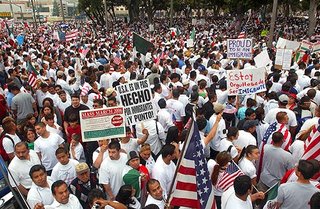
As a child of the Sixties, I have a visceral reaction to the sight of such completely peaceful mass protests: unalloyed delight. This right here, this is democracy in action. It is The People, making damn sure their voice is heard past all the baffles and blinders of official Washington. The marches instantly put me on the side of the protesters, and it took a couple days for me to be able to sit back and look at the whole issue from a more dispassionate perspective.
First off: there is, alas, no denying that there already exists in the United States a large and economically crucial underclass of cheap labor. Historically, this is nothing new: first we had slaves, then we had sharecroppers who were basically the same slaves with a different name and some "rights" they were rarely allowed to exercise, and now we have illegal immigrants performing that work. If you want to buy cheap oranges at the grocery store, you absolutely depend on the labor of these migrant workers--the purchase of a carton of orange juice is, in effect, your sanction and subsidy of what was once called slave labor. (In fact, according to a recent Pew Hispanic Center report, the majority of unauthorized workers are employed in construction--that summer house you're building, for example.) Can we, in our greatness, stop exploting these people? Sure, but there will be consequences: the prices of a whole lot of things will rise sharply; a number of American businesses will fail; and the economy of Mexico would take a drastic hit and could well collapse entirely. (Because the Mexican immigrants send money back home, which goes a long way toward invigorating their home country's national economy.)
I have written before about my Russian friend Tanya Kolosova; after I brought her to the U.S., she applied for and was granted a student visa, and did some maid work to help bring in cash. She told me once that sending back $50 U.S. to her family in Russia every month amounted to far more than she could possibly earn living there at home, and the same is true for Mexican workers. The dollar is a potent thing in a lot of places, and that money heading home makes a crucial difference in the lives of an awful lot of Mexican families.
The Drum Major Institute for Public Policy, created by former civil rights associates of Dr. King including Andrew Young, has put out a remarkable policy paper that summarizes the various issues far more effectively than I ever could. It is worth noting the very first bullet point of their executive summary:
On average, immigrants pay more in taxes each year than they use in government services, and these taxes fund programs like Social Security that strengthen and expand the middle class.
The essential argument for stricter immigration policies has always been that "these people" (there's a hint right there) are creating a drain on local governmental resources by, for example, demanding health care they can't pay for. But the DMI's research clearly demonstrates that the opposite is true, that their contributions to the tax base more than outweigh any strain on resources. Bear in mind that anything these workers purchase here in the U.S. comes with a sales tax, which they pay; and that those who have fake Social Security numbers are in fact paying income taxes into the system.
Are these workers illegal? Yes they are. I'm not trying to deny that at all. But nonetheless, we rely on them and they rely on us--there is benefit on both sides. So isn't it better to seek to legitimize their efforts? Instead, Congressional efforts through last week all seemed to be about criminalizing and demonizing. I roundly applaud Cardinal Mahoney for taking a very strong position against the idea of making a criminal out of anyone who gives aid to illegal immigrants, including churches: that idea was about as unAmerican as anything I've ever heard, downright disgraceful, and bravo to Cardinal Mahoney for flat-out promising to ignore any such law if enacted.
It was this sort of absurd overreaching that prompted the weekend's demonstrations and, happily, the Congress seems to have hastily backed off. So for now, there seems to be real improvement--but Senator Frist could still upset the apple cart by ignoring the committee's recommendations and substituting for the Senate's consideration a more punitive bill of his own. And if such a thing should actually pass, well I can't imagine that the resulting demonstrations would remain peaceful for long.
Next time: the bracero program; plus, in a sign of the Apocalypse, I find myself agreeing with President Bush. Yikes!
No comments:
Post a Comment